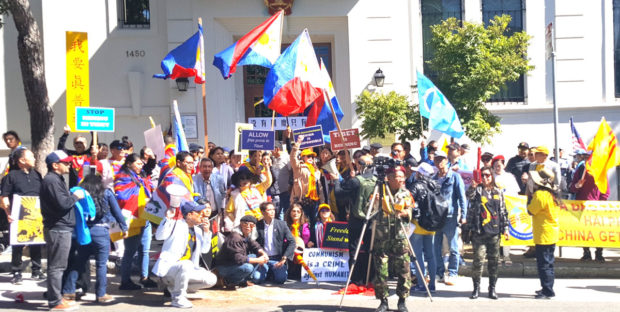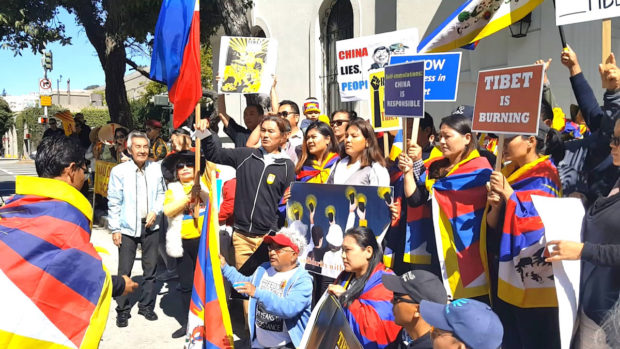Filipino, Vietnamese, Uyghur, Tibetan, Hong Kong protesters coalesce in anti-Beijing action

Carrying placards and their nations’ flags, protesters from Vietnam, Tibet, Muslim Uyghur, Hong Kong and the Philippines gather in front of the Chinese Consulate in San Francisco to condemn Communist China’s policies. INQUIRER/Jun Nucum
SAN FRANCISCO — China’s critics from different countries took turns lambasting it in front of its San Francisco consulate as the People’s Republic marked its 70th founding anniversary.
Leaders and members of the Filipino, Vietnamese, Tibetan, Hong Kong and Muslim Uyghur communities converged for the first time to denounce Beijing’s “bullying tactics” not only against its minorities, but also against neighboring smaller countries.
The protesters’ joint statement, “Unite and Oppose China’s Hegemony And Imperialist Aggression,” expressed strong opposition to “the aggressive and imperialist policy of China and its hegemony in Southeast Asian Sea (or South China Sea) as it imposes its ‘nine-dash line’ policy in clear violation of the sovereignty of its neighboring nations like the Philippines, Vietnam, Taiwan, Korea, Japan, Malaysia, Brunei and Indonesia.”
Protesters also condemned China’s
“• policy of illegally and forcibly of sending Muslim Uyghurs to internment camps for “re-education” as well as decades of occupation and repression of the people of Tibet;
- intervention and brutal suppression of Hong Kong protesters in violation of Hong Kong´s status as a Special Autonomous Region (SAR) under “One Nation, Two Systems” 50-year treaty with Britain.
- violation of the national sovereignty of Taiwan as well as the regional autonomy of Muslim Uyghurs and Hong Kong;
- occupation of the West Philippine Sea (WPS), seven islands and several reefs all of which fall within the 200-mile Exclusive Economic Zone (EEZ) as defined by the United Nations Convention on the Law of the Sea (UNCLOS) and firmly affirmed by the International Permanent Arbitration Court decision at The Hague in 2016: and
- occupation of the Paracels and other islands it grabbed from Vietnam in the 1970s and bringing Chinese people into Vietnam to reside illegally with the intent to turn Vietnam into a vassal autonomous region of China.”
The statement was jointly signed by leaders of Asians Against China’s Occupation and Repression (ACOR), Anti-China Expansion Movement, Milpitas for Vietnam’s Freedom, Filipino- American Human Rights Alliance (FAHRA), US Pinoys for Good Governance, Uyghur HR Project, and Students for Free Tibet.
FAHRA’S Ago Pedalizo reminded everyone in the rally that one of the top founding leaders of the China Communist Party Deng Hsiao Ping, in an address before the United Nations in 1974, strongly stated that, “If one day China should change her color and turn into a superpower, if she too should play the tyrant in the world, and everywhere subject others to her bullying, aggression and exploitation, the people of the world should identify her as social-imperialism, expose it, oppose it and work together with the Chinese people to overthrow it.”
“It is remarkable that countries oppose to China have come together for this protest rally in accordance with what Hsiao Ping told the UN,” he noted.

Protesters from different countries opposed to China vow to meet and stage another protest rally at the Chinese Consulate on December for the International Day of Human Rights. INQUIRER/Jun Nucum
Another FAHRA leader, Donny de Leon, thanked Vietnam whose fishermen “saved the lives of Filipino fishermen whose fishing boat was rammed by a Chinese fishing vessel and were left to fend for themselves.”
De Leon also denounced China’s ploy to extend a helping hand even in Africa but charging countries high interests and then taking territory for these countries’ failure to pay.
A Hong Kong protester wearing a mask to hide his face introduced himself as John Smith and spoke as “an individual who cares about individual freedoms and liberties which the Chinese government is not granting.”
“In coming here, I want to make people realize that what is happening in Hong Kong is very important to the world within the next coming years. We need to stand as united front to defend democracy and freedom,” Smith stressed.
Hong Kong protesters want the U.S. to pass the Hong Kong Human Rights Democracy Act to assert and keep strong the one-country two-system policy and ensure that the Chinese Communist Party cannot infringe on the rights of the Hong Kong people.
.
The Hong Kong Human Rights and Democracy Act of 2019 is a bipartisan legislation reintroduced in the light of the 2019 Hong Kong extradition bill proposal and the ensuing protests against China.
Representatives of Hong Kong protesters Denise Ho and Joshua Wong urged members of the U.S. Congressional-Executive Commission on China in September 2019 to ask support for the bill, which is not “an inappropriate U.S. involvement in another country’s affairs.”
San Francisco Regional Tibetan Youth Congress President Lobsang Dorji blasted “the illegal (activities of China) and its seventy years of violence, lies, and operations against Tibet, Hong Kong, and Taiwan.
Dorji argued that China is slowly globalizing its policies on Hong Kong and Tibet. He urged “the people of the world to stand united so we can stay happy and peaceful enjoying basic human rights.”
Vietnamese rally leader Jeff Doan likewise condemned Beijing for its occupation of neighboring islands in the South China Sea that belong to Vietnam and Philippines.
“They harass the fishermen, they grab, rob, kill (the resources) and occupy lands. They disturb the countries. We ask them to stop that and we will stand up and defend our countries,” Doan stated. “We will boycott them, we will not buy their products.”
Doan, whose Vietnamese delegation was the biggest in the protest, with participants coming all the way from Sacramento, vowed to come back to the Chinese consulate and hold a similar protest rally in observance of International Human Rights Day on December 10.

